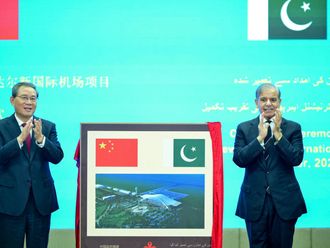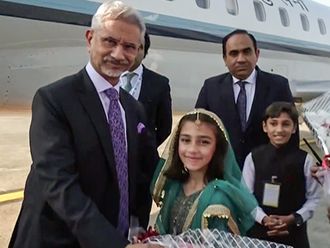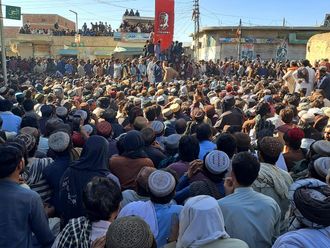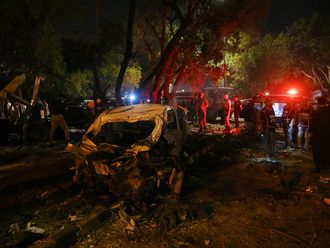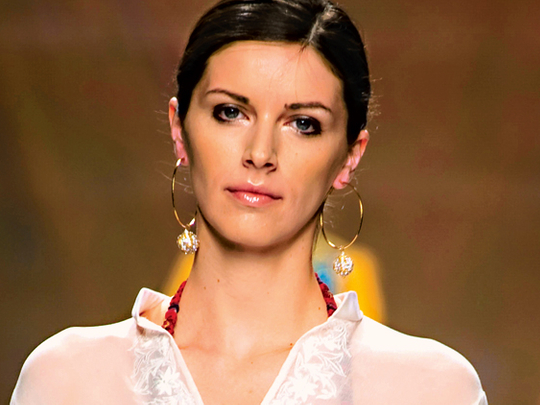
The fashion-savvy residents of the UAE always have their eye out for the latest big names. Recently, Pakistan has been the focus of their attention. "I've been showing in Dubai for four years. Dubai is the cosmopolitan, happening hub of Asia. Most of our clients are here," says Deepak Perwani, often referred to as Pakistan's bad boy of fashion.
Umar Sayeed, a Pakistani designer of bridal and formal wear, agrees. "Dubai is one of the emerging fashion capitals of the world. It offers a huge opportunity to expand and also to learn. The emirate has a very high population of stylish people. Also, it is a truly cosmopolitan city where one gets the challenge to appeal to a gigantic spectrum of tastes keeping one's own signature intact. And those who wear stylish and beautiful clothes will always do so. "The current economic scenario may reduce spending on the number of outfits, but it can never make people of taste compromise on quality. And Dubai has a fairly discerning eye when it comes to style."
Pakistan's top designers certainly have the fashion credentials to back up their recent surge in popularity here. Perwani boasts a standing ovation for his latest Milan collection, while cutting-edge designer, Nadya Shah, graduated in women's wear and textile design from the prestigious London fashion college, Central St Martins, which has also educated the likes of Alexander McQueen, John Galliano and Giles Deacon.
If Pakistan seems like an unlikely fashion capital, it's worth remembering that designer Maheen Khan is often referred to as the Coco Chanel of the East, and designers such as Perwani are stocked in such far-flung destinations as London, New York, Dallas, Singapore and, of course, the UAE.
But it's not just the UAE and the fashion world that are benefiting from Pakistan's talented designers, says Perwani. "I've been a designer for the past 16 years, and in that time we have influenced Pakistan fashion and style immensely. Before us there were no clothes available for weddings and formal nights, no prêt market, no casual or western wear. We changed that and pushed the boundaries.
"They told us we couldn't do hot pants — we did hot pants. They told us we couldn't do skimpy — we did skimpy. They told us we couldn't do mini skirts — we did those too," he says.
Changing world view
"Fashion is progression, and it influences how you see a country or civilisation. Our designs have definitely affected the way people see Pakistan. People were very surprised there was fashion in Pakistan — it was the second top story in the world for two weeks. People often have negative views of Pakistan, but this was something positive," says Perwani.
For those not familiar with the designers of Pakistan, the boutique Soiree is a great place to discover them. Pakistani designers tend to shy away from diamante-studded, showy designs and make a statement with cut and colour instead.
"My style of clothing is rather elegant, comfortable and chic," says Sayeed. "In fact, understatement is what I love most. I don't like over-the-top stuff. Even when I do heavy outfits I make sure that they are easy and soft on the senses."
He adds, "My style is for people who understand and appreciate finesse, sophistication and intricacy. I don't like in-and-out trends; I prefer to create timeless, classic pieces that are to be cherished for generations."
Shah agrees that classic pieces are at the forefront of her mind whilst designing. "My clothing today is influenced by women who love feminine, timeless pieces and perhaps are very busy and don't have much time, but who have a strong sensibility of what they like to wear and wear it in their own creative way. I find it very inspirational that perhaps a client in Singapore would wear an ensemble very differently to someone in Karachi but both can manage to make it look equally flattering," she says.
A sense of identity
Perwani says the key to this accessible style is to keep designs, "minimalist progressive. We have our own style and we're not scared to show it. I don't like too much embellishment or embroidery and I hate bling."
These designers' styles have been influenced heavily by growing up in Pakistan, says Perwani. "Our style is a fusion between East and West — our evening wear, for instance is very eastern. The current collection was previewed in Milan. It's inspired by the Baloch tribes of Pakistan. There's a lot of colour, and white. No black — thank god.
"When I look at the collection, it makes me feel happy. Colour always makes you happy. When we were designing the concept, we thought of Balochistan for the headgear, the colour and the style. We thought, why not?"
"Growing up in Pakistan has been a very interesting multi-cultural experience," says Sayeed. "People may not believe it but Karachi, my home town, is a very stylish, cosmopolitan city. Exposed to western influence as well as eastern traditions, the city is truly a melting pot. So, unconsciously, one imbibed all such influences as one grew up.
"Secondly, my mother is a very stylish and well-dressed woman. She also taught me a great deal about traditional clothes, therefore I have a good understanding of traditional costumes, crafts, textiles and dying techniques," adds Sayeed.
Shah has also felt the traditions of Pakistan influence her work, despite her London education. "I started in western women's wear, it was very structured and form-based clothing, but gradually while working in Pakistan we started a combination of European > and subcontinental crafts, which for me was a tremendous breaking point. Working with craftsmen enabled me to produce a great deal of interesting techniques and methods of restructuring a classic stitch or weave. We then concentrated on evening, bridal wear with a very subtle effective balance and concentrating on form, lightness and fluidity," says Shah.
While the designers have been influenced by their home, they hope that, in turn, their designs will shed a new light on Pakistan. Perwani, whose philosophy of ‘be Pakistani, buy Pakistani and promote Pakistan' makes him an ideal ambassador for the progression of the nation.
"We all look for positive change in society," he says. "Pakistanis want the world to feel positive about us. We need the global village to support us not think we are backward — because we are not. Smile at us and we'll smile right back. And our fashion industry is something Pakistani's can be truly proud of."


